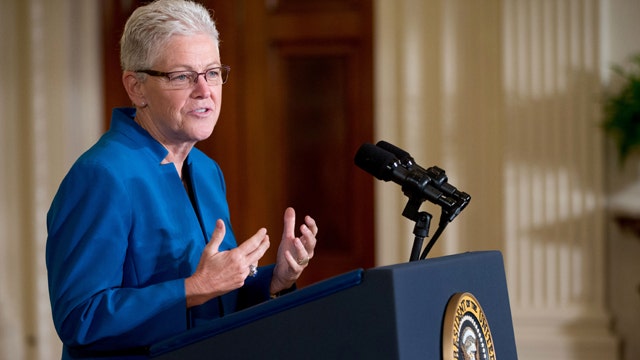EPA pushes new regulations on oil and gas industries
David Mercer and Brad Blakeman on uproar over Obama administration's decision
The Environmental Protection Agency unveiled plans Tuesday to slash methane emissions from oil and gas production almost in half, the latest in a series of administration regulations aimed at curbing global warming.
The proposal, though, looked set to face stiff opposition from energy groups and Republicans lawmakers, who accused the administration of pandering to “the fantasies of the environmental Left.”
The target to cut methane by 40 to 45 percent by 2025 (compared against 2012 levels) was accompanied by proposed regulations cutting emissions from new natural gas wells, along with standards for drilling to reduce leakage on public lands.
The regulations would require energy producers to find and repair leaks at oil and gas wells and capture gas that escapes from wells that use fracking. The administration said the rules would apply only to emissions from new or modified natural gas wells, meaning thousands of existing wells would not have to comply.
"Today, through our cost-effective proposed standards, we are underscoring our commitment to reducing the pollution fueling climate change and protecting public health while supporting responsible energy development, transparency and accountability," EPA Administrator Gina McCarthy said in a statement.
EPA officials estimated the regulations would cost industry between $320 million and $420 million in 2025, with reduced health care costs and other benefits totaling about $460 million to $550 million.
In a conference call Tuesday, EPA Acting Assistant Administrator Janet McCabe said the new regulations would result in methane reductions of 20-30 percent by 2025. However, McCabe repeatedly refused to be specific about where the remaining reductions would come from, despite being pressed on the matter multiple times by reporters.
“What I am saying is that as we move forward, additional opportunities will be identified in order to get to the goal,” McCabe said. “It doesn’t mean we have every last one of them identified at this moment.”
Republican lawmakers and energy groups were swift in their condemnation of the new proposals, with many arguing methane emissions have been falling in recent years.
“The EPA’s plan to limit emissions flies in the face of technological reality. The truth is that while the oil and natural gas industry has greatly increased production on state and private lands, methane emissions have actually fallen,” House Committee on Natural Resources Chairman Rob Bishop, R-Utah, said in a statement. “The Obama Administration continues to prioritize the fantasies of the environmental Left over American energy security and economic growth.”
“The oil and gas industry is leading the charge in reducing methane,” American Petroleum Institute President Jack Gerard said. “The last thing we need is more duplicative and costly regulation that could increase the cost of energy for Americans.”
Others expressed doubt about handing the EPA more power in the light of the recent toxic Colorado river spill, caused by EPA workers.
“If recent events are any indicator, giving more power to EPA doesn't necessarily yield positive results. Just ask the citizens who live near and depend on the Animas River,” Tom Pyle, president of the Institute for Energy Research, said in a statement.
The Obama administration is expected to finalize the rules next year after a public consultation period.
The latest regulations come just weeks after the Obama administration announced more regulations on carbon emissions from power plants, calling for a 32 percent emissions cut by 2030, as compared with 2005 levels. Republicans vowed to fight the changes and a number of states and power companies immediately filed legal challenges.
The administration has also proposed regulations targeting carbon pollution from planes, and has set new standards to reduce pollution from trucks and vans.
Environmentalists praised the new rules, but noted that the ambitious goals announced under the proposals would be difficult to meet without targeting existing wells.
David Doniger, climate policy director for the Natural Resources Defense Council called the new regulations "a good start,” adding that the EPA “needs to follow up by setting methane leakage standards for existing oil and gas operations nationwide."
The Associated Press contributed to this report.












































